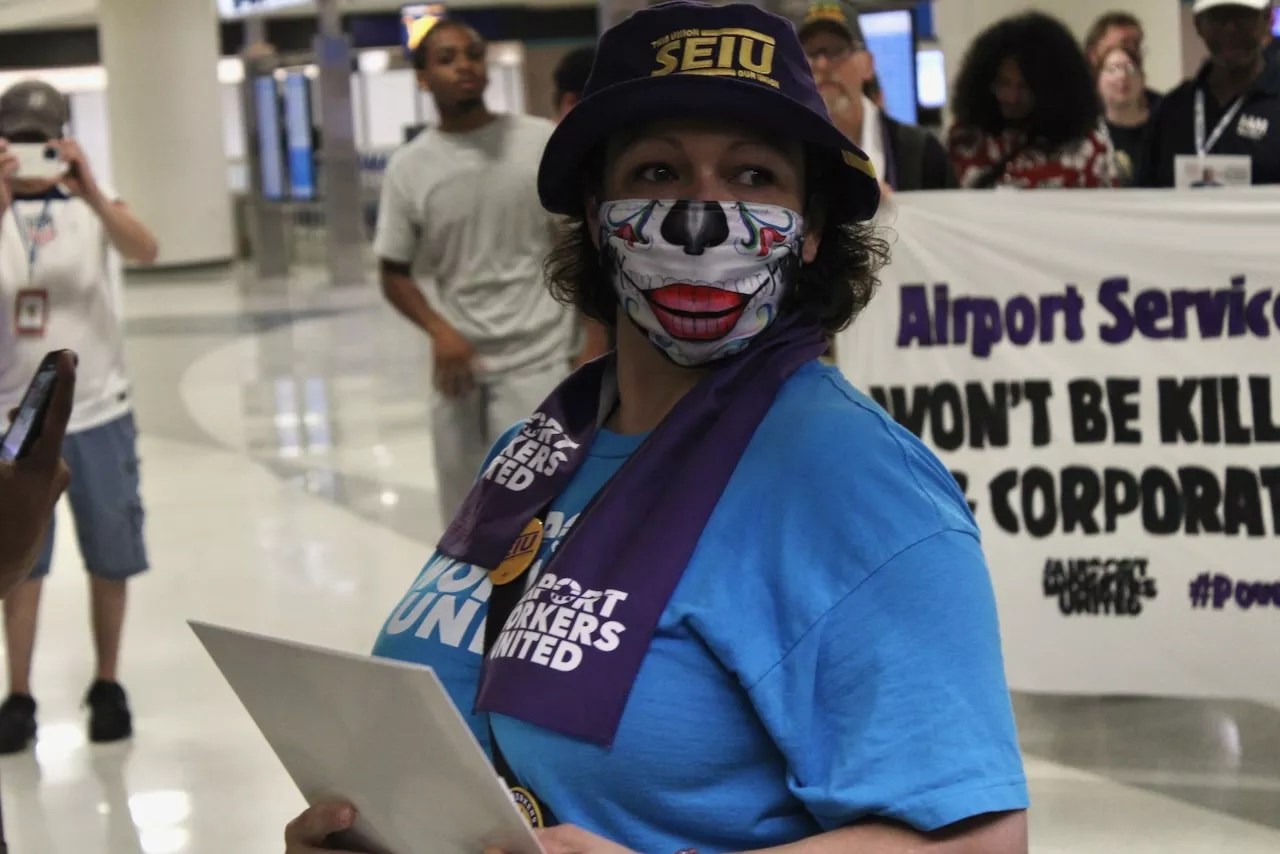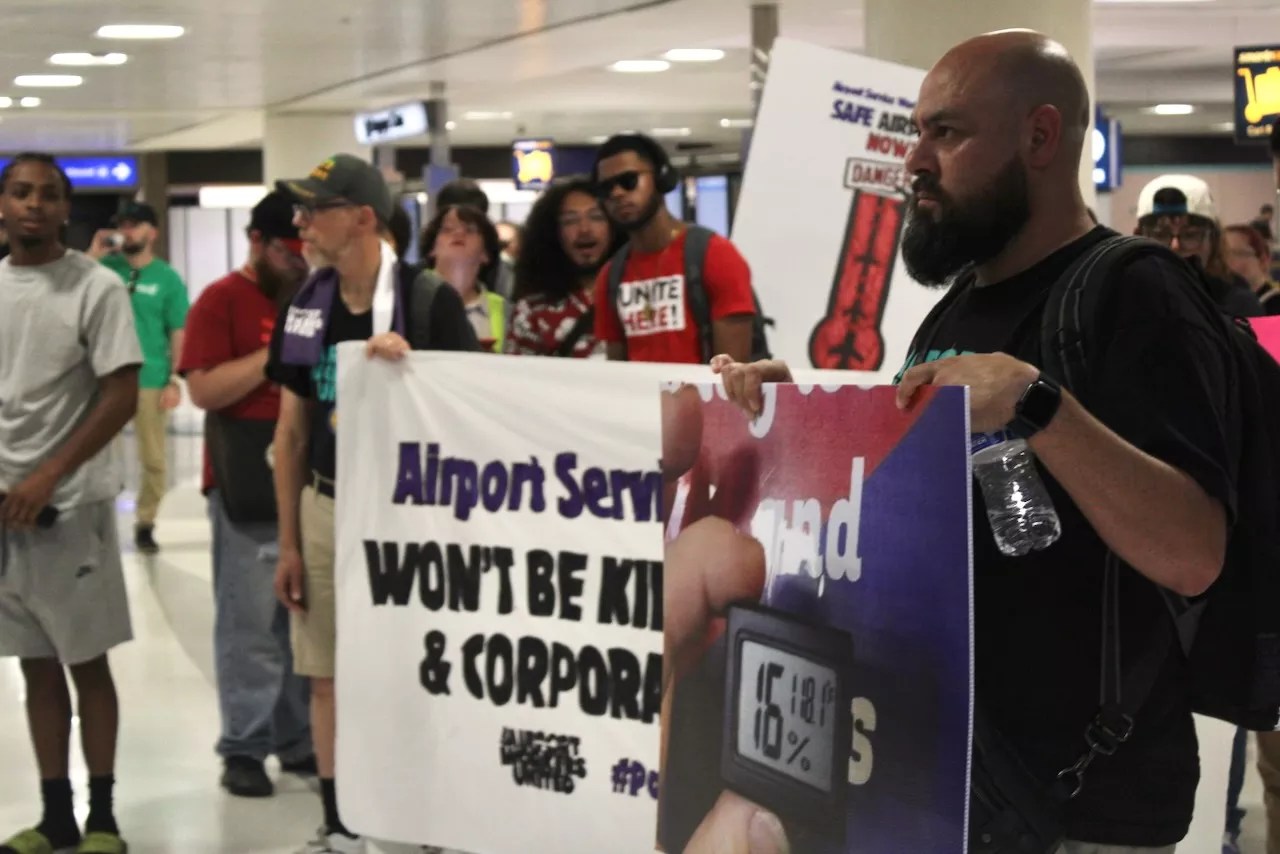
Morgan Fischer

Audio By Carbonatix
With a Dia de los Muertos mask over her face, a union-branded purple bucket hat on her head and a matching cooling towel around her neck, Cecilia Ortiz stood outside of her employer’s office on Tuesday and demanded the company do something to protect her from the heat.
Ortiz, a passenger service agent at Phoenix Sky Harbor International Airport, has been one of the loudest voices in a movement to demand more heat protections for airport workers. On Tuesday, she was joined near Terminal 4 baggage claim by dozens of other union members and airline service workers holding signs and banners featuring slogans such as “Heat Kills” and “Water, Shade, Rest.”
The workers had assembled so that Ortiz could hand a copy of the city of Phoenix’s recently passed heat ordinance to Prospect Airport Services, which employs many airport employees, including airline cabin cleaners, baggage handlers and ground crew. Though the ordinance was passed in March, workers say Prospect still has not complied with it.
The ordinance requires city contractors such as Prospect to maintain a heat safety plan that provides outdoor workers with cool drinking water, breaks and access to air conditioning, plus training on heat illness and first aid. The workers, who are organized under Service Employees International Union, say no heat illness-related training has been given to management or staff and that outdoor places, such as jet bridges between planes and boarding areas, remain without air conditioning.
Ortiz waited an hour for someone from Prospect management to meet with her and receive the letter, but nobody came. Speaking to Phoenix New Times, she had a message for the company.
“Look, you guys are not going to pay attention to what’s going on. Here it is. You can’t ignore it anymore,” Ortiz said.”You have to answer to this.”
This fight is nothing new for airport service employees, nor is the Phoenix heat. But the heat is getting worse. The National Weather Service predicts the Valley’s average temperature will be nearly 100 degrees this summer, breaking last year’s record of 97.
Alana Billingsley, a Phoenix-based American Airlines flight attendant, is disappointed that the city has yet to make critical changes to protect Phoenix workers from the heat, similar to how other cities protect workers from weather events such as earthquakes and hurricanes.
“With Phoenix, they should know better. It’s no surprise,” said Billingsley, who is an organizer for the Association of Professional Flight Attendants. “Every year this happens, it gets hot, and it keeps getting hotter, and they have still not taken responsibility to make sure that there are safe conditions for employees.”

Workers stand in Phoenix Sky Harbor International Airport’s Terminal 4 baggage claim with signs demanding heat protections.
Morgan Fischer
‘These are literally the rules now’
In March, the Phoenix City Council passed a heat ordinance designed to safeguard many outdoor service workers employed by city contractors. It mandates that, at minimum, workers are provided with drinking water, are given regular breaks and have access to shaded areas or air conditioning and that safety training is available, among other protections.
Airline workers long have dealt with a lack of adequate water or breaks, as well as extremely hot temperatures. These issues especially affect aircraft cleaners. They wait in hot jet bridges for passengers to deplane before boarding to clean a cabin that is no longer air-conditioned.
“Once everybody disembarks, they turn off the air,” said labor organizer Rasean Clayton, who made headlines for keeping Kanye West off the 2020 presidential ballot in Arizona. “It’s like sitting in a hot car. So you want me to sit in a hot car, clean it, and you’re not going to provide me any kind of hydration or extended break?”
The protections outlined in the ordinance have yet to take effect or have just been ignored by airport employers, workers said. Many airlines workers still have limited access to water, break rooms and training on protecting themselves amid Phoenix’s extreme heat.
“You have people passing out at work, being rushed to the hospital for heat-related stress and injuries, which is wrong,” Clayton said. “These companies make billions of dollars a year.”
After nobody appeared to receive Ortiz’s letter, the delegation of union organizers traveled to Terminal 3 to make a second attempt at delivering the city’s ordinance to their employer. Again, they were unsuccessful.
“These are literally the rules now, we just need the corporations to comply with them,” Ortiz said.
Their efforts did not go completely unnoticed. Three service workers in the Terminal 4 baggage claim told organizers that they wished to join the union but have faced resistance. The workers, who are employed by a company that offers wheelchair transportation for Southwest Airlines passengers, said they’ve been dealing with heat concerns of their own, as well as low wages and understaffing.
Despite the unsuccessful delivery, organizers don’t plan on stopping – or limiting their demands to just Phoenix. According to organizers, workers in Dallas, Atlanta and Chicago are going to the headquarters of American, Southwest and Delta airlines on Wednesday to request these companies take action since service providers won’t even meet with them.
“We’re not going to be silent about it,” Billingsley said. “We’re going to take this all the way up the chain.”